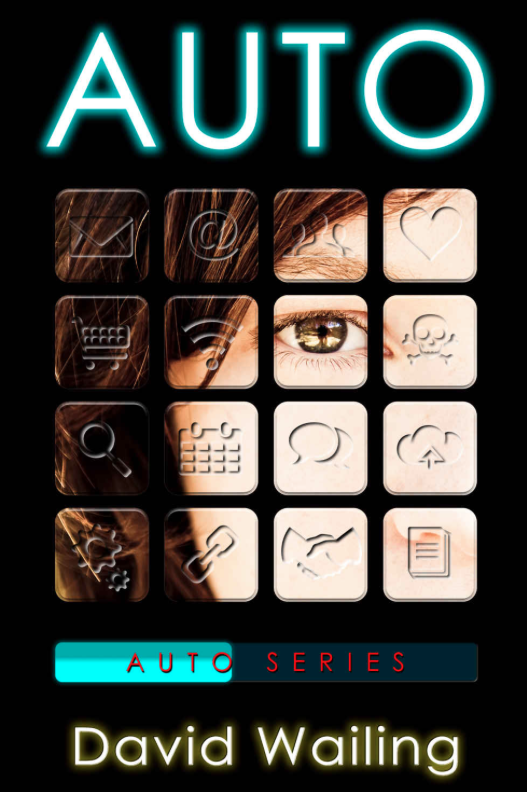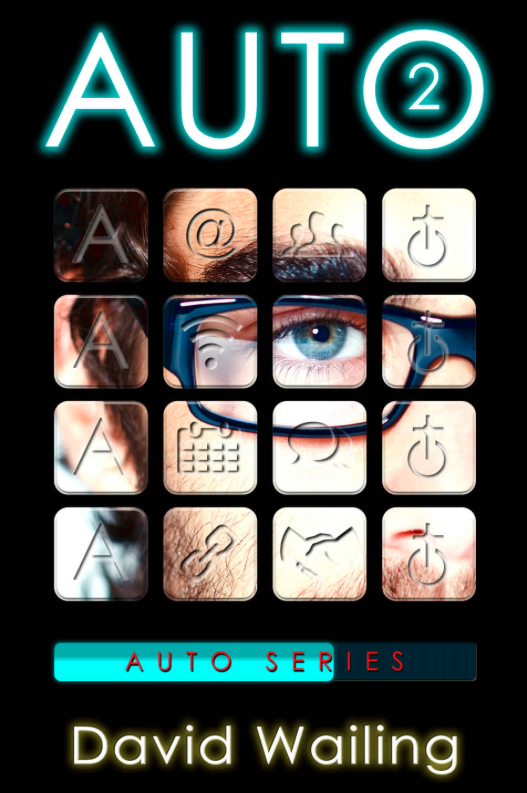Book review: the Auto Series by David Wailing


Auto and Auto 2
by David Wailing
Recently I read Auto 2 by David Wailing and I was about to post this review when I realised I had never actually reviewed the first volume in this remarkable series. To address this oversight, here’s a combo review of both volumes.
First, to get some terminology out of the way, I’ll address both Auto and Auto 2 as ‘novels’ or ‘books’ throughout this document, but both are in fact short story cycles. A number of the stories have been published separately, and can be enjoyed as distinct pieces, but I think for full appreciation they’re best read in the order presented here. Auto 2 continues directly on from the events in the first volume; they’re both very much part of the same story.
Auto
The original Auto novel came out in 2013 and I tremendously enjoyed it at the time, despite having already read several of the included shorts separately. It’s set in 2022 and imagines a future in which every aspect of online life is conducted with the aid of an Auto – an artificial intelligence designed to help people manage the unmanageable demands of social media, email, and all other online interactions. In fact, by 2022 it’s almost impossible to use the internet without an Auto; anonymous web access is illegal, and the proliferation of smart tech has affected every last corner of society. Smart eyewear, smartwatches, and ‘autophones’ are absolutely ubiquitous. ‘Nonlines’, who refuse to use an Auto, are completely cut off from the internet and live radically different (and less convenient) lives.
This is effective and edgy science fiction. Like the best scifi, it’s at once forward-thinking and absolutely believable – it takes the world that exists today and pushes it just a little bit further. Through a fast-paced and thrilling plot, David Wailing explores some heavy-hitting themes. What happens to a person’s online presence when they die? What are the potential consequences of cyber-crime and cyber-terrorism? What happens when an AI assistant starts making decisions on its own? And what place does literature have in this slightly frightening but entirely believable vision of the imminent future?
One thing I really enjoyed about Auto is that the author doesn’t go in for any heavy-handed moralising about the dangers of technology. The overall impression is that this new tech is both incredibly empowering and yet also very dangerous to the unwary, like many other things in life. AI as ‘the enemy’ is a well-worn trope in scifi by now, and I’m glad to say that Auto treads a more interesting and less predictable path. The overall impression is that we’re standing on the verge of a brave new world of both massive opportunity and massive risk.
The story-cycle structure also works really well. Each story meshes with the rest; they can be read individually, but read them in order and you get a lot more from the overall experience.
Auto is a great book and a wonderful piece of contemporary scifi.
Auto 2
Auto 2 is the sequel to David Wailing’s original Auto, and includes a number of new stories. It picks up immediately after the events of the first volume, and the stakes are significantly higher. One of the main themes in Auto 2 is the danger of hacktivists causing untold havoc in a web landscape dominated by AI assistants – Autos that can exist after a person’s death and continue to manage their affairs, or potentially be exploited by hackers for nefarious purposes. The fluid nature of identity is another interesting theme, and I also found it interesting how religion rapidly adapts to a world where AI is everywhere.
The plot is just as fast-paced as the original Auto, and the characters are just as interesting, but I must admit I didn’t enjoy it quite as much as the original book. I think it’s because, almost three years after reading Auto, many of the predictions are either rapidly coming to pass or are directly on the horizon. In short, it doesn’t feel as surprising or ground-breaking as the original. That’s a testament to the strength of the original book, but it’s also a signal of how fast times are changing. I think in a few short years both of these books may, sadly, feel old-fashioned.
That aside, this is still a cracking tale and very much an integral part of the entire series. If you’ve read and enjoyed the first book then this is essential reading, and you won’t be disappointed.
Overall, the Auto Series is a fascinating look into one possible future for the internet, and the dazzling array of possibilities and dangers that await us as AI becomes more and more important in our lives.
Find out more at www.davidwailing.com.
Alex Roddie Newsletter
Join the newsletter to receive the latest updates in your inbox.



